Hamell Surname Ancestry ResultsOur indexes 1000-1999 include entries for the spelling 'hamell'. In the period you have requested, we have the following 13 records (displaying 1 to 10): Buy all | | | Get all 13 records to view, to save and print for £70.00 |
These sample scans are from the original record. You will get scans of the full pages or articles where the surname you searched for has been found. Your web browser may prevent the sample windows from opening; in this case please change your browser settings to allow pop-up windows from this site. The English in France
(1443)
King Henry VI of England (one of the grandsons of Charles VI of France) claimed the throne of France (and quartered the fleurs-de-lis of France with the lions of England on the royal standard) as had his predecessors since Edward III, as descendants of Philip IV of France. The English had real power or influence in Brittany, Normandy, Flanders and Gascony, and actual possession of several coastal garrisons, in particular Calais, where the French inhabitants had been replaced by English. Henry VI came to the throne only seven years after his father had trounced the French at Agincourt; but his cousin, Charles VII, who became king of France in the same year, spent his long reign rebutting the English king's claim to his throne by territorial reconquest and consolidation. The English administration kept a series of records called the French Rolls. On these are recorded royal appointments and commissions in France; letters of protection and safe-conduct to soldiers, merchants, diplomats and pilgrims travelling to France from England and returning, and to foreign legations. There are also licences to merchants to export to the Continent, and to captains to transport pilgrims. As Henry VI's reign progressed, and the English grip on northern France loosened, the French Rolls also increasingly include entries concerning the ransoming of English prisoners.HAMELL. Cost: £6.00.  | Sample scan, click to enlarge
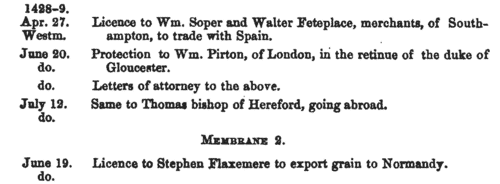
| Liegemen and Traitors, Pirates and Spies
(1550-1552)
The Privy Council of Edward VI was responsible for internal security in England and Wales, and dealt with all manner of special and urgent matters
HAMELL. Cost: £4.00.  | Sample scan, click to enlarge

| Wiltshire freeholders
(1625-1645)
Inquisitions post mortem were held after the death of freeholders who held their estates in capite or in chief, i. e., directly from the crown. The inquisition, held by the royal escheator upon the oath of jurors from the county who were also normally freeholders, recorded what estates the deceased had held, by what tenure, what they were worth, the date of death, who was the next heir, and whether the heir was of age. The sample scan shows an unusually brief inquisition: these abstracts usually run to two or three pages of print. HAMELL. Cost: £4.00.  | Sample scan, click to enlarge
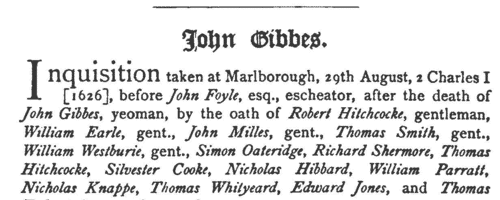
| Treasury Books
(1702)
Records of the Treasury administration in Britain, America and the colonies, for 1702. Also includes Treasury minutes for early 1691; secret service accounts from 1689 to 1702, and accounts of the Civil List (royal expenditure) and army debts that had accumulated by the time of the death of king William III (8 March 1702).
HAMELL. Cost: £4.00.  | Sample scan, click to enlarge
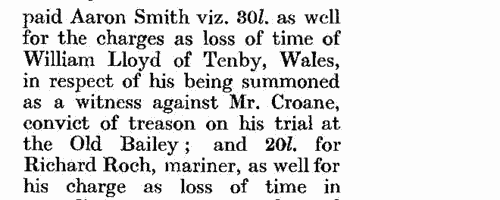
| Masters of Merchantmen at Charleston (1788)
The custom house at Charleston, South Carolina, reported ships entered inwards, cleared outwards and sailed. These give the type of vessel, the name of the vessel, surname of the master, and (for ships arriving) whence they had come, or (for ships departing) their proposed destination. Most of the traffic was with other American ports (over 700 ships a year), Britain (about 150), and the West Indies.
HAMELL. Cost: £8.00.  | Sample scan, click to enlarge

| Deaths, Marriages, News and Promotions
(1811)
Death notices and obituaries, marriage and birth notices, civil and military promotions, clerical preferments and domestic occurrences, as reported in the Gentleman's Magazine. Mostly from England and Wales, but items from Ireland, Scotland and abroad.
HAMELL. Cost: £4.00.  | Sample scan, click to enlarge

| Deaths, Marriages, News and Promotions
(1814)
Death notices and obituaries, marriage and birth notices, civil and military promotions, clerical preferments and domestic occurrences, as reported in the Gentleman's Magazine. Mostly from England and Wales, but items from Ireland, Scotland and abroad.
HAMELL. Cost: £4.00.  | Sample scan, click to enlarge
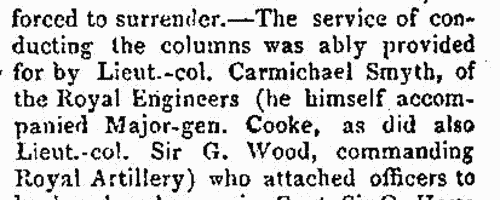
| Deaths, Marriages, Literary News, Bankrupts, Patents, and Dissolutions of Partnerships
(1822)
English death, marriage and birth notices, bankruptcies, certificates and dividends, dissolutions of partnerships, literary news, and patents, as reported in the European Magazine. Includes some marriages and deaths from Ireland, Scotland and abroad, and Scottish sequestrations (bankruptcies). January to June 1822.
HAMELL. Cost: £6.00.  | Sample scan, click to enlarge

|  British merchant seamen
(1835-1836) British merchant seamen
(1835-1836)
At this period, the foreign trade of ships plying to and from the British isles involved about 150,000 men on 15,000 ships; and the coasting trade about a quarter as many more. A large proportion of the seamen on these ships were British subjects, and so liable to be pressed for service in the Royal Navy; but there was no general register by which to identify them, so in 1835 parliament passed a Merchant Seamen's Registration Bill. Under this act this large register of British seamen was compiled, based on ships' crew lists gathered in British and Irish ports, and passed up to the registry in London. Each seaman was assigned a number, and the names were arranged in the register by first two letters of the surname (our sample scan shows one of the pages for 'Sm'); in addition, an attempt was made to separate out namesakes by giving the first instance of a name (a), the second (b), and so on. But no effective method was devised to prevent the same man being registered twice as he appeared in a second crew list; moreover, the original crew lists were clearly difficult for the registry clerks to copy, and some of the surname spellings appear to be corrupted. A parliamentary committee decided that the system devised did not answer the original problem, and this register was abandoned after less than two years: but it is an apparently comprehensive source for British merchant seamen in 1835 to 1836. The register records the number assigned to each man; his name; age; birthplace; quality (master, captain, mate, 2nd mate, mariner, seaman, fisherman, cook, carpenter, boy &c.); and the name and home port of his ship, with the date of the crew list (usually at the end of a voyage). Most of the men recorded were born in the British Isles, but not all (for instance, Charleston and Stockholm appear in the sample scan). The final column 'How disposed of' is rarely used, and indicates those instances where a man died, was discharged, or deserted his ship during the voyage.HAMELL. Cost: £8.00.  | Sample scan, click to enlarge
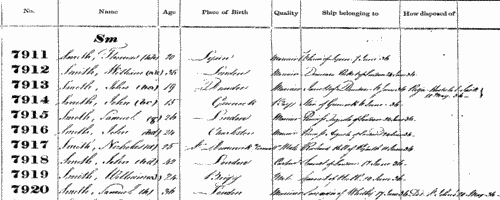
| Irish Insolvents
(1838)
Insolvency notices for Ireland: insolvency often caused people to restart their lives elsewhere, so these are an important source for lost links, especially for emigrantsHAMELL. Cost: £6.00.  | Sample scan, click to enlarge

|
| 1 | 2 |  |
Research your ancestry, family history, genealogy and one-name study by direct access to original records and archives indexed by surname.
|













